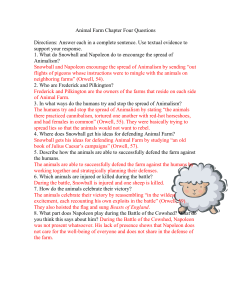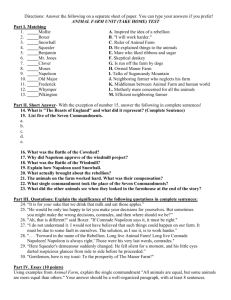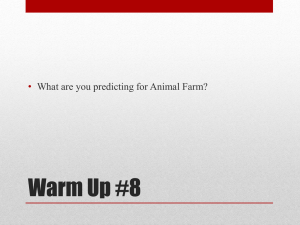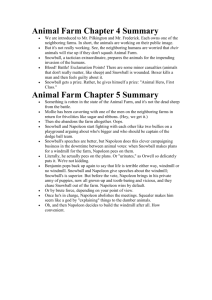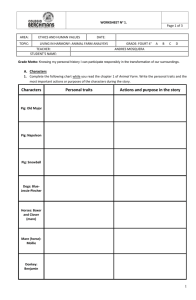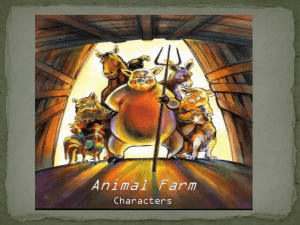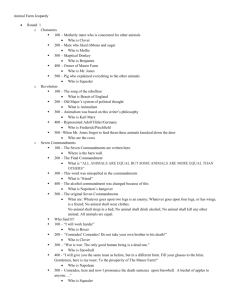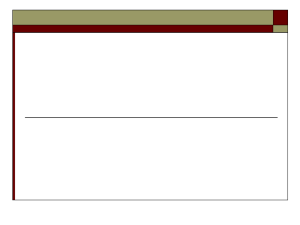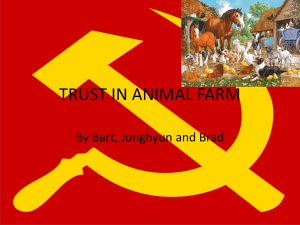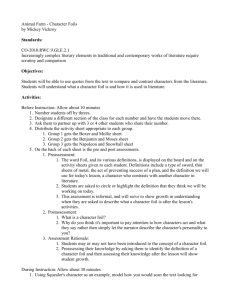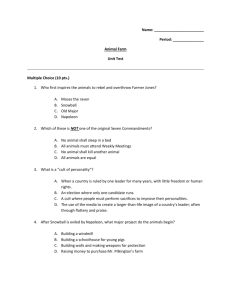Animal Farm Quote Bank Activity - Year 9 English
advertisement
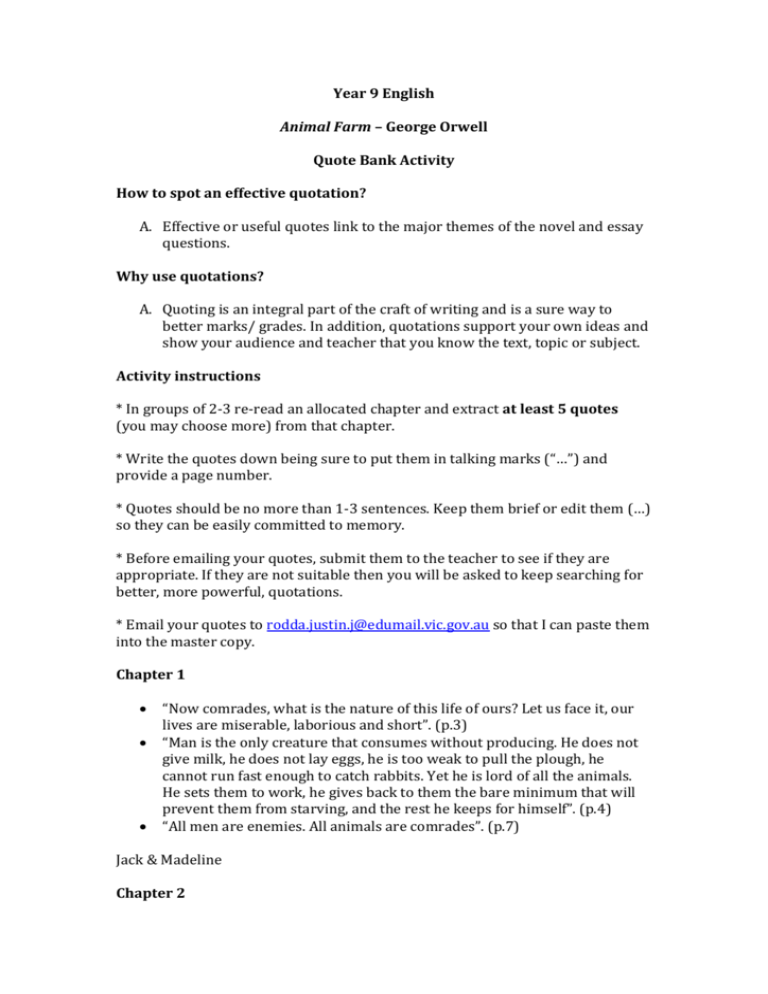
Year 9 English Animal Farm – George Orwell Quote Bank Activity How to spot an effective quotation? A. Effective or useful quotes link to the major themes of the novel and essay questions. Why use quotations? A. Quoting is an integral part of the craft of writing and is a sure way to better marks/ grades. In addition, quotations support your own ideas and show your audience and teacher that you know the text, topic or subject. Activity instructions * In groups of 2-3 re-read an allocated chapter and extract at least 5 quotes (you may choose more) from that chapter. * Write the quotes down being sure to put them in talking marks (“…”) and provide a page number. * Quotes should be no more than 1-3 sentences. Keep them brief or edit them (…) so they can be easily committed to memory. * Before emailing your quotes, submit them to the teacher to see if they are appropriate. If they are not suitable then you will be asked to keep searching for better, more powerful, quotations. * Email your quotes to rodda.justin.j@edumail.vic.gov.au so that I can paste them into the master copy. Chapter 1 “Now comrades, what is the nature of this life of ours? Let us face it, our lives are miserable, laborious and short”. (p.3) “Man is the only creature that consumes without producing. He does not give milk, he does not lay eggs, he is too weak to pull the plough, he cannot run fast enough to catch rabbits. Yet he is lord of all the animals. He sets them to work, he gives back to them the bare minimum that will prevent them from starving, and the rest he keeps for himself”. (p.4) “All men are enemies. All animals are comrades”. (p.7) Jack & Madeline Chapter 2 1. 2. 3. 4. 5. 6. 7. “Mr Jones feeds us. If he were gone we should starve to death” (p.11) “Will there still be sugar after the rebellion?” (p.11) “And shall I be allowed to wear ribbons in my mane?” asked Mollie (p.11) “The Seven Commandments “Whatever goes upon two legs is an enemy What even goes upon four legs, or has wings, is a friend No animal shall ever wear clothes No animal shall sleep in a bed No animal shall drink alcohol No animal shall kill any other animal All animals are equal”. (p.17) “Never mind the milk, Comrades”(p.18) By Brooke, Courtney and Tammy. Chapter 3 “The animals were happy as they had never conceived it possible to be. Every mouthful of food was an acute positive pleasure, now that it was truly their own food, produced by themselves and for themselves, not doled out to them by a grudging master”. (p.) “I will work harder”. (p.20) “FOUR LEGS GOOD, TWO LEGS BAD” (p.24) Daniel & Jamison Chapter 4 “It was given out that the animals there practiced cannibalism, tortured one another with red-hot horseshoes, and had their females in common. This was what came of rebelling against the laws of Nature Frederick and Pilkington said”. (p.28) “’I have no wish to take a life, not even human life’, repeated Boxer, and his eyes were full of tears”. (p.28) Josh & Daniel Chapter 5 “No one believes more firmly than Comrade Napoleon that all animals are equal. He would be only too happy to let you make your own decisions for yourselves. But sometimes you might make the wrong decisions, comrades, and then where should we be”? (p.40) “Napoleon is always right (p.41) Sam & James Chapter 6 “All that year the animals worked like slaves. But they were happy in their work; they grudged no effort or sacrifice, well aware that everything they did was for the benefit of themselves and those of their kind who would come after them, and not for a pack of idle, thieving human beings”. (p.) insipid Rory & Darcy Chapter 7 “Snowball, he has been here, I can smell him”. (p.53) “Snowball fought bravely at the battle of the cowshed”. (p.59) “I don’t believe snowball was a traitor at the beginning”. (p.60) “They were always cold, and usually hungry as well”. (p.) “If a window was broken or a drain was blocked, someone was certain to say that Snowball had come in the night and done it, and when the key of the store-shed was lost, the whole farm was convinced that Snowball had thrown it down the well. Curiously enough, they went on believing this even after the mislaid key was found under a sack of meal”. (p.52) “If she herself had had any picture of the future, it had been of a society of animals set free from hunger and the whip, all equal, each working according to his capacity, the strong protecting the weak”. (p.) “They had come to a time when no one dared speak his mind, when fierce, growling dogs roamed everywhere, and when you had to watch your comrades torn to pieces after confessing to shocking crimes”. (p.) By Brayden & Adrian Chapter 8 “Some of the animals remembered or thought they remembered that the Sixth Commandment decreed ‘No animal shall kill any other animal’. And though no one cared to mention it in the hearing of the pigs or the dogs, it was felt that the killings that had taken place did not square with this”. (p.78) “It had become usual to give Napoleon the credit for every successful achievement and every stroke of good fortune. You would often hear one hen remark to another, ‘Under the guidance of our Leader, Comrade Napoleon, I have laid five eggs in six days; or two cows enjoying a drink at the pool, would exclaim, ‘Thanks to the leadership of Comrade Napoleon, how excellent this water tastes”. (p.) Jessica, William & Ashleigh Chapter 9 “A horses lungs do not last forever”. (p.80) “Long live comrade Napoleon”. (p.83) “Do you understand what this means they are taking him to the knackery”. (p.88) “Don’t take your own brother to death”. (p.89) “Besides, in those days they had been slaves and now they were free, and that made al the difference, as Squealer did not fail to point out”. (p.) By Brayden & Adrian Chapter 10 “Napoleon has denounced such ideas as contrary to the spirit of Animalism. The truest happiness, he said, lay in working hard and living frugally”. (p.) “Only old Benjamin professed to remember every detail of his long life and to know that things never had been, nor ever could be much better or much worse – hunger, hardship and disappointment being, so he said, the unalterable law of life”. (p.85) “ALL ANIMALS ARE EQUAL, BUT SOME ARE MORE EQUAL THAN OTHERS” (p.90) “No question now, what had happened to the faces of the pigs. The creatures outside looked from pig to man to pig, and from pig to man again; but already it was impossible to say which was which”. (p.95) “A time came when there was no one who remembered the old days before the Rebellion”. [pg.85] “Many animals had been born to whom the rebellion was only a dim tradition”. [pg.85] “They were still the only farm in the whole country – in all England! owned and operated by animals”. [pg.87] ‘Then they saw what Clover had seen. It was a pig walking on his hind legs.’ [pg.89] “Mr. Pilkington once again congratulated the pigs on the low rations, the long working hours and the general absence of pampering which he had observed on animal farm”. [pg.93] “The white hoof and horn with which it had previously been marked had now been removed. It would be a plain green flag from now onwards”. [pg.94] “The name ‘animal’ farm had been abolished. Henceforward the farm was to be known as ‘The Manor Farm’ which he believed, was its correct and original name”. [pg.94] “But the luxuries of which Snowball had once taught the animals to dream, the stalls with electric light and hot water, and the three-day week were no longer talked about”. [pg.86] Sarah, Maddison & Tom

